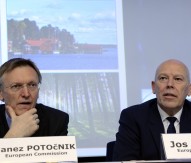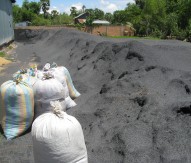
Biochar: climate action
Action to combat climate change is a key goal of the EU. The organisation’s commitment to tackling the warming of the planet is exemplified in the estimated €3bn research investment budget under the Societal Challenges pillar of Horizon 2020. One substance which could assist in mitigating the effects of climate change is biochar.
Biochar (created by pyrolysis of biomass) can increase soil fertility and agricultural productivity as well as provide protection against some foliar and soil-borne diseases. The substance is under investigation as an approach to carbon sequestration to produce negative carbon dioxide emissions and consequently has the potential to help mitigate climate change through this process. Biochar can also reduce pressure on forests, though the degree to which results offer long-term carbon sequestration in practice has been challenged.
At the Agricultural Research Organization, part of the Israeli Ministry of Agriculture and Rural Development, scientists are working to improve the current understanding of how biochar functions in modern agricultural systems. Research includes the impact of biochar on plant productivity and resistance to biotic and abiotic stresses, pH-dependent nutrient release and surface properties of biochar, the effect of biochar amendments on pest and weed control, and the impact of biochar on soil microbial activity and community dynamics.
Professor Yigal Elad, of the Plant Pathology Office, outlines the need for more research into the potential applications of biochar, the future of biochar and its varied potential applications.
While biochar has clear uses at, for instance, the smaller scale, what more do you feel needs to be done to accurately describe the benefits for more large scale deployments?
More research is necessary in most, if not all, aspects of biochar deployment, because there are many things which remain unclear. When biochar is applied to soil, it will stay there for a very long time – it has a half-life in soil of hundreds, if not thousands, of years – and so if a mistake is made, the effects of that mistake will be almost irreversible.
Thus, more research is needed to ensure that there are no negative drawbacks for this type of activity, and then, once we are sure that biochar is safe, it can begin to be deployed on a large scale. Of course, it is important that farmers are made aware of biochar technology, and there are now various activities working in this direction. This is not only being undertaken by ARO scientists, as there are also several groups working elsewhere on biochar with the task of making it available for farmers.
In addition to this, the EU now backs research into biochar, as well as biochar mixed with compost and other areas, and so there is a distinct sense that things have begun to move in the right direction.
How would you like to see governmental co-operation evolve in order to work towards the successful deployment of biochar?
Biochar is multifaceted, in that it can be used to a variety of ends, and, therefore, there are many areas which require additional research. My own areas of expertise centre around the effects of biochar on plants and crops, particularly with regard to plant diseases. However, biochar also has a role in the mitigation of climate change through its ability to capture carbon dioxide, and, as it is embedded in soil, has a lot of potential to be a powerful tool in the fight against climate change. It is important, then, that governments come to emphasise the role of biochar in CO2 mitigation and/or capturing.
What are your views on current research priorities in the area, and how will the Volcani Center help to promote the use of biochar?
More research needs to be conducted into the various aspects of biochar and we have to be sure that no harm is done to the environment. While this may sound somewhat straightforward, any damage that biochar does do to the environment is not obvious, and so checks have to be made and evidence gathered.
With different types of biochar, which are from different biomass sources or are prepared in different ways (in that different temperatures can be used to prepare the biochar), may well dictate whether it is okay for use or not.
At the Volcani Center, we are running a project on biochar which is financed by Israel’s Minister of Agriculture’s Chief Scientist, and through which we are able to study the various aspects of biochar use, including both the negative and positive effects, under controlled conditions.
In addition, experiments are still running under field conditions in places where it is safe to use it. Once the biochar has been deployed, and after a certain, pre-defined time, we will collect the soil and other environmental materials and test them. It will be interesting to see what results are achieved from the controlled and field condition studies.
Generally, the EU is interested in alternatives for fossil fuels, and biochar can be used in this sense, while there is also the additional use of biochar in CO2 mitigation and so as a way to tackle global warming and climate change. As such, the EU should back more in depth research into the various aspects of biochar, either as an alternative energy source or as a soil amendment in a way that will be environmentally safe.
Biochar has a lot of potential in areas as diverse as climate change and (as I am discovering through my own research into the effects of biochar on plant productivity and plant diseases), even pest controls.
Thus, once we are sure how to use it and we are sure that it will not have any serious environmentally negative effects, I have every faith that we will see biochar coming to be used much more widely.
Professor Yigal Elad



